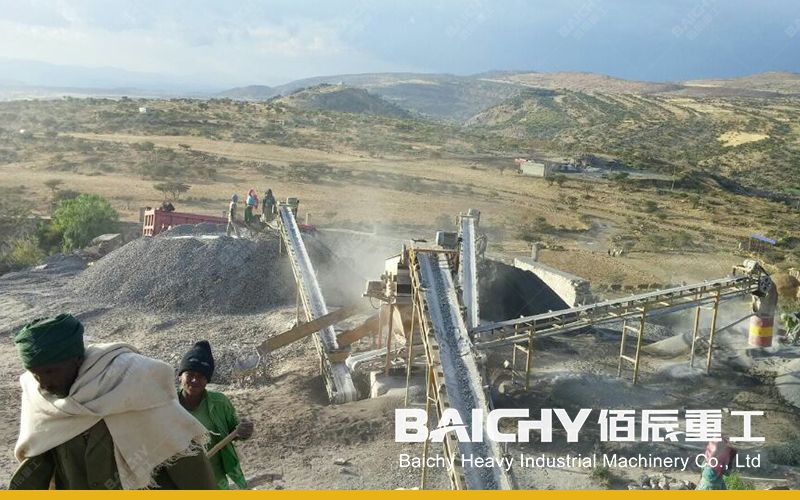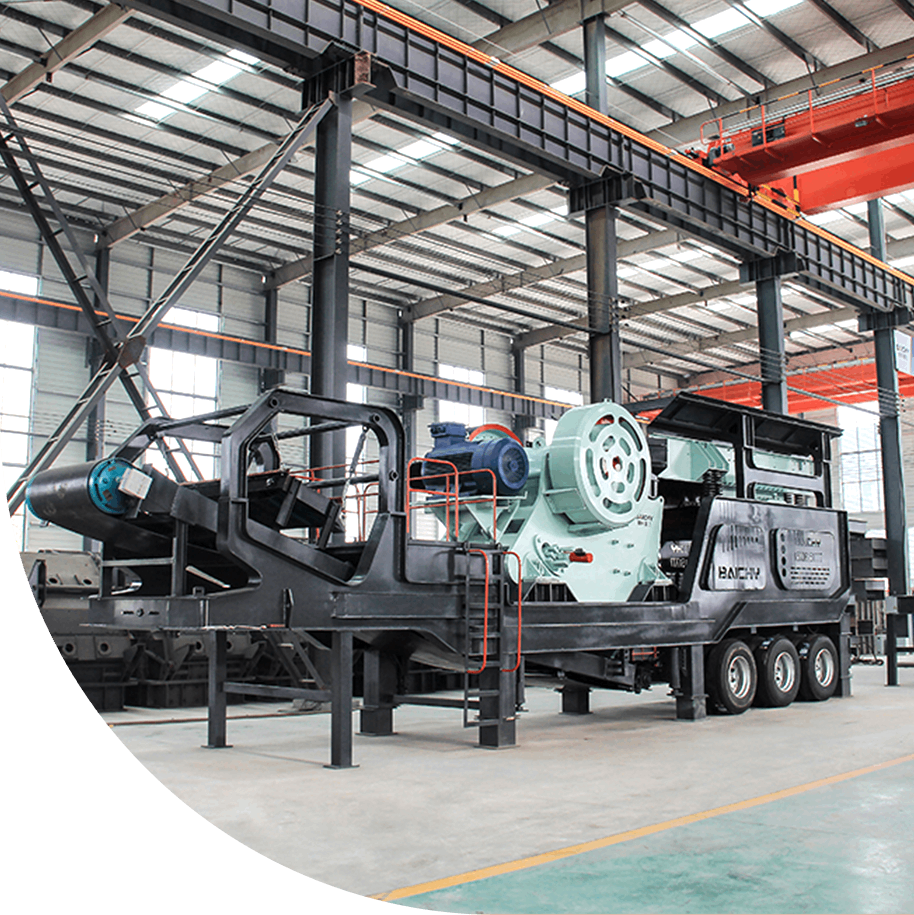
The advent of modern technology has revolutionized the construction and mining industries, with the stone crusher plant emerging as a cornerstone in enhancing operational efficiency and facilitating the production of high-quality aggregates. Equipped with advanced machinery and sophisticated processes, these crusher plants offer a multitude of advantages that contribute to the seamless execution of various construction projects and mining operations. Let's discuss what are the benefits of a stone-crushing plant.
Introduction to Stone Crushers
A stone crusher is a piece of equipment designed to take large rocks as input (Feed) and produce small rocks, gravel, or rock dust as output. They are used to produce rock-fill material for such uses as landscaping and erosion control.
A crushing plant is a row of machines that break down large chunks of material into smaller pieces in the quickest most efficient way. Crushing plants are an important part of the mining, quarrying, and recycling industries.
Advantages of stone crusher plant
1. Enhanced Operational Efficiency
Stone crusher plants are built to quickly and efficiently reduce large rocks to smaller, more manageable pieces. This saves you time and reduces the amount of manual work needed. By being so efficient, these plants can greatly increase the amount of work you can complete.
The advent of modern technology has revolutionized the construction and mining industries, with the stone crusher plant emerging as a cornerstone in enhancing operational efficiency and facilitating the production of high-quality aggregates. Equipped with advanced machinery and sophisticated processes, these crusher plants offer a multitude of advantages that contribute to the seamless execution of various construction projects and mining operations. Let's discuss what are the benefits of a stone-crushing plant.
2. Introduction to Stone Crushers
A stone crusher is a piece of equipment designed to take large rocks as input (Feed) and produce small rocks, gravel, or rock dust as output. They are used to produce rock-fill material for such uses as landscaping and erosion control.
A crushing plant is a row of machines that break down large chunks of material into smaller pieces in the quickest most efficient way. Crushing plants are an important part of the mining, quarrying, and recycling industries.
Advantages of stone crusher plant
1. Enhanced Operational Efficiency
Stone crusher plants are built to quickly and efficiently reduce large rocks to smaller, more manageable pieces. This saves you time and reduces the amount of manual work needed. By being so efficient, these plants can greatly increase the amount of work you can complete.
2. Flexible Crushing Capabilities
One of the best things about stone crusher plants is their flexibility. They can handle a wide variety of materials, from very hard granite to softer limestone. This flexibility means you can use the same plant for different projects without making big changes.
3. Saving on Costs
Investing in a stone crusher plant pays off in the long run. It reduces the need for manual labor and crushing time, making your operations more efficient and reducing labor costs. Plus, you can often get crushed stone locally, saving on transportation costs.
4. Maintaining High Quality
Having consistent quality in construction materials is very important, and stone crusher plants do this very well. The controlled crushing process ensures that the resulting materials meet the required standards. This consistency is key to ensuring your projects are durable and reliable.
5. Environmental Benefits
Modern crushing plants are designed with environmental considerations in mind. Many come equipped with features like dust suppression systems to minimize the release of particulate matter into the air. This not only ensures compliance with environmental regulations but also fosters a more sustainable approach to construction and mining.
6. Reduced Downtime
Downtime can be a significant bottleneck in any construction or mining project. Stone crusher plants are built for reliability and durability. They are less prone to breakdowns and require minimal maintenance when compared to other machinery. This translates to fewer interruptions in your operations.
7. Customization Options
Every project is unique, and stone crusher plants can be customized to suit specific requirements. Whether you need a plant with a high production capacity, different crushing stages, or additional features like screening capabilities, customization is possible to meet your project’s exact needs.
8. Types of Stone Crushing Machines
There are also several types of crushing plants, such as jaw crushers, cone crushers, and impact crushers, which can be used for various applications. The type of crusher used depends on the characteristics of the rock, as well as the desired output size of the crushed material.
• Jaw crushers: Jaw crushers are designed to handle the pre-crushing technology of any material, from the softest limestone to the hardest granite. Jaw crushers are preferred as they are the main crushers in both fixed and mobile crushing plants. The hydraulic adjustment mechanism allows the jaw gap to be adjusted according to the desired final product particle size. Jaw crushers are often used for primary crushing in production lines.
• Cone crushers: Cone crushers are designed for secondary and tertiary crushing applications. They work by compressing the material between a rotating cone and a fixed concave bowl. The cone crusher uses a spiral motion to move the material down and between the cone and bowl, where it is crushed and reduced in size. Cone crushers are known for their ability to produce a finer, more uniform product, making them ideal for applications where particle size distribution is critical.
• Impact crushers: In this type of crusher, the material is reduced by impact. They are the perfect solution for crushing soft and medium-hard materials with high production capacity and cubic-shaped products. Our impact crushers have a high crushing ratio to meet secondary crushing requirements and help maximize plant capacity. Adjustment and maintenance are easily performed due to the hydraulic adjustment mechanism.
In addition to the crushers, the stone crushing plant will also include other components such as screens, conveyors, and feeders, which will help to control the flow of materials and ensure that the materials are processed efficiently.
Conclusion
In summary, the advantages of integrating a stone crusher plant into construction and mining operations are manifold, ranging from enhanced operational efficiency and perse application capabilities to cost-effective resource utilization and sustainable environmental practices. The streamlined maintenance protocols and efficient service support further contribute to the seamless functioning of these crusher plants, ensuring the continuous delivery of high-quality aggregates and reinforcing their pivotal role in the modern construction and mining sectors.
One of the best things about stone crusher plants is their flexibility. They can handle a wide variety of materials, from very hard granite to softer limestone. This flexibility means you can use the same plant for different projects without making big changes.
Saving on Costs
Investing in a stone crusher plant pays off in the long run. It reduces the need for manual labor and crushing time, making your operations more efficient and reducing labor costs. Plus, you can often get crushed stone locally, saving on transportation costs.
Maintaining High Quality
Having consistent quality in construction materials is very important, and stone crusher plants do this very well. The controlled crushing process ensures that the resulting materials meet the required standards. This consistency is key to ensuring your projects are durable and reliable.
Environmental Benefits
Modern crushing plants are designed with environmental considerations in mind. Many come equipped with features like dust suppression systems to minimize the release of particulate matter into the air. This not only ensures compliance with environmental regulations but also fosters a more sustainable approach to construction and mining.
Reduced Downtime
Downtime can be a significant bottleneck in any construction or mining project. Stone crusher plants are built for reliability and durability. They are less prone to breakdowns and require minimal maintenance when compared to other machinery. This translates to fewer interruptions in your operations.
Customization Options
Every project is unique, and stone crusher plants can be customized to suit specific requirements. Whether you need a plant with a high production capacity, different crushing stages, or additional features like screening capabilities, customization is possible to meet your project’s exact needs.
Types of Stone Crushing Machines
There are also several types of crushing plants, such as jaw crushers, cone crushers, and impact crushers, which can be used for various applications. The type of crusher used depends on the characteristics of the rock, as well as the desired output size of the crushed material.
Jaw crushers: Jaw crushers are designed to handle the pre-crushing technology of any material, from the softest limestone to the hardest granite. Jaw crushers are preferred as they are the main crushers in both fixed and mobile crushing plants. The hydraulic adjustment mechanism allows the jaw gap to be adjusted according to the desired final product particle size. Jaw crushers are often used for primary crushing in production lines.
Cone crushers: Cone crushers are designed for secondary and tertiary crushing applications. They work by compressing the material between a rotating cone and a fixed concave bowl. The cone crusher uses a spiral motion to move the material down and between the cone and bowl, where it is crushed and reduced in size. Cone crushers are known for their ability to produce a finer, more uniform product, making them ideal for applications where particle size distribution is critical.
Impact crushers: In this type of crusher, the material is reduced by impact. They are the perfect solution for crushing soft and medium-hard materials with high production capacity and cubic-shaped products. Our impact crushers have a high crushing ratio to meet secondary crushing requirements and help maximize plant capacity. Adjustment and maintenance are easily performed due to the hydraulic adjustment mechanism.
In addition to the crushers, the stone crushing plant will also include other components such as screens, conveyors, and feeders, which will help to control the flow of materials and ensure that the materials are processed efficiently.
Conclusion
In summary, the advantages of integrating a stone crusher plant into construction and mining operations are manifold, ranging from enhanced operational efficiency and perse application capabilities to cost-effective resource utilization and sustainable environmental practices. The streamlined maintenance protocols and efficient service support further contribute to the seamless functioning of these crusher plants, ensuring the continuous delivery of high-quality aggregates and reinforcing their pivotal role in the modern construction and mining sectors.











